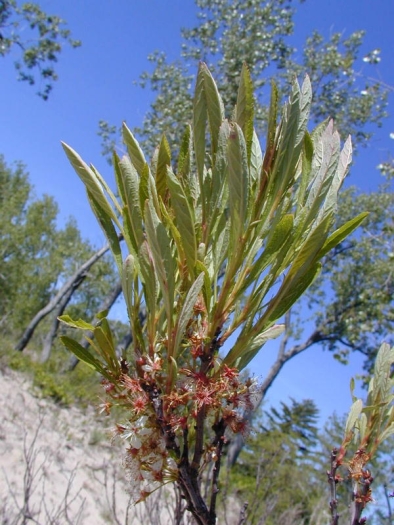Appalachian Sandcherry
(Prunus susquehanae)
Appalachian Sandcherry (Prunus susquehanae)
/
/

Troy Weldy
Attribution
Image By:
Troy Weldy
Recorded By:
Copyright:
Attribution
Copyright Notice:
Photo by: Troy Weldy | License Type: Attribution | License URL: https://creativecommons.org/licenses/by-sa/4.0/ | Uploader: Easchiff | Publisher: Wikimedia Commons | Title: Prunus_pumila_var_pumila,_June.jpg | Notes: Uploaded own work with UploadWizard |



























Estimated Native Range
Summary
Prunus susquehanae, commonly known as Appalachian Sandcherry, is a deciduous shrub native to open woodlands, forest edges, and dry, sandy plains in Eastern North America, particularly the Appalachian region. It typically grows to a height and width of 3 feet (0.9 meters), forming a compact, rounded shape. The Appalachian Sandcherry is adorned with clusters of small, fragrant white flowers in the spring, which are followed by small, dark purple fruits that are attractive to birds and other wildlife.
The Appalachian Sandcherry is valued for its low maintenance requirements and its ability to thrive in poor, dry soils, making it an excellent choice for xeriscaping and naturalistic plantings. It is often used in residential landscapes for its ornamental flowers and as a wildlife attractant. This shrub prefers full sun but can tolerate partial shade and requires well-drained soils. While generally disease-resistant, it can be susceptible to pests like borers and diseases such as black knot. It is not known for being invasive and is a suitable choice for gardeners looking to add native plants to their landscape.CC BY-SA 4.0
The Appalachian Sandcherry is valued for its low maintenance requirements and its ability to thrive in poor, dry soils, making it an excellent choice for xeriscaping and naturalistic plantings. It is often used in residential landscapes for its ornamental flowers and as a wildlife attractant. This shrub prefers full sun but can tolerate partial shade and requires well-drained soils. While generally disease-resistant, it can be susceptible to pests like borers and diseases such as black knot. It is not known for being invasive and is a suitable choice for gardeners looking to add native plants to their landscape.CC BY-SA 4.0
Plant Description
- Plant Type: Shrub
- Height: 2.5-3 feet
- Width: 1.5-2.5 feet
- Growth Rate: Moderate
- Flower Color: White
- Flowering Season: Spring
- Leaf Retention: Deciduous
Growth Requirements
- Sun: Full Sun
- Water: Low
- Drainage: Fast
Common Uses
Bee Garden, Bird Garden, Butterfly Garden, Drought Tolerant, Low Maintenance, Rabbit Resistant, Showy Flowers
Natural Habitat
Open woodlands, forest edges, and dry, sandy plains in Eastern North America
Other Names
Common Names:
Scientific Names: , Prunus pumila var. susquehanae, Prunus pumila subsp. susquehanae, Prunus susquehanae, Prunus cuneata, Prunus pumila var. cuneata, Cerasus susquehannae, Cerasus cuneata, Cerasus susquehana,
GBIF Accepted Name: Prunus susquehanae Willd.